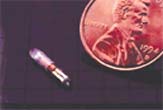UPDATE US Immigration Policy

from Technovelgy.com
Scott Silverman, Chairman of the Board of VeriChip Corporation, has proposed implanting the company's RFID tracking tags in immigrant and guest workers. He proposed using VeriChip RFID implants to register workers at the border, and then verify their identities in the workplace. He has reportedly talked to many people in Washington about using it.
The VeriChip is a very small Radio Frequency Identification (RFID) tag about the size of a large grain of rice. It can be injected directly into the body; a special coating on the casing helps the VeriChip bond with living tissue and stay in place. A special RFID reader broadcasts a signal, and the antenna in the VeriChip draws power from the signal and sends its data. The VeriChip is a passive RFID tag; since it does not require a battery, it has a virtually unlimited life span.
RFID tags have long been used to identify animals in a variety of settings; livestock, laboratory animals and pets have been "chipped" for decades.
Privacy advocates have long expressed concerns about this technology being used in human beings.
from Yahoo! News
Gov. Arnold Schwarzenegger agreed to send the California National Guard to the Mexican border, ending a 17-day standoff with the Bush administration. The two sides had been at odds over whether California Guardsmen would join the effort to bolster the Border Patrol and who would pay for it.
They reached an agreement under which California will contribute about 1,000 Guardsmen for border duty and the federal government will pick up the full cost.
Schwarzenegger intends for the mission to be carried out mostly by troops who volunteer for six- to 12-month assignments. The Bush plan called for sending Guardsmen on border duty instead of their annual two-and-three week training exercises.
The state would have to pay for normal training sessions, while long-term assignments are funded by the federal government.
National Guard troops will be used for engineering, road and fence building, transportation, logistics and surveillance, reconnaissance and port-of-entry duties but not direct law enforcement.


No comments:
Post a Comment